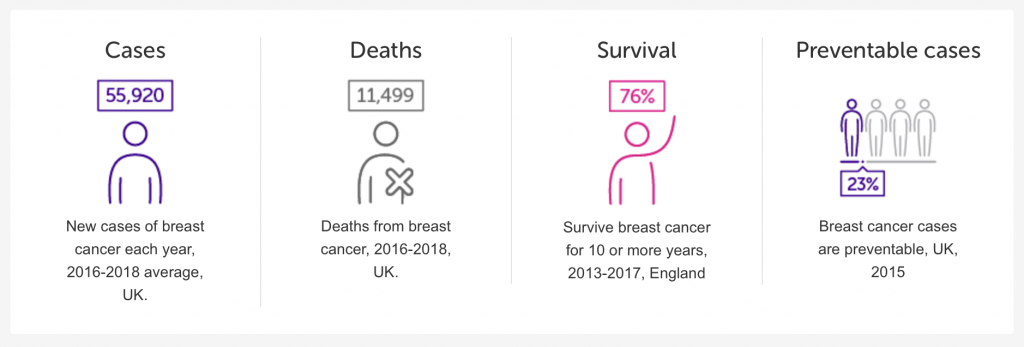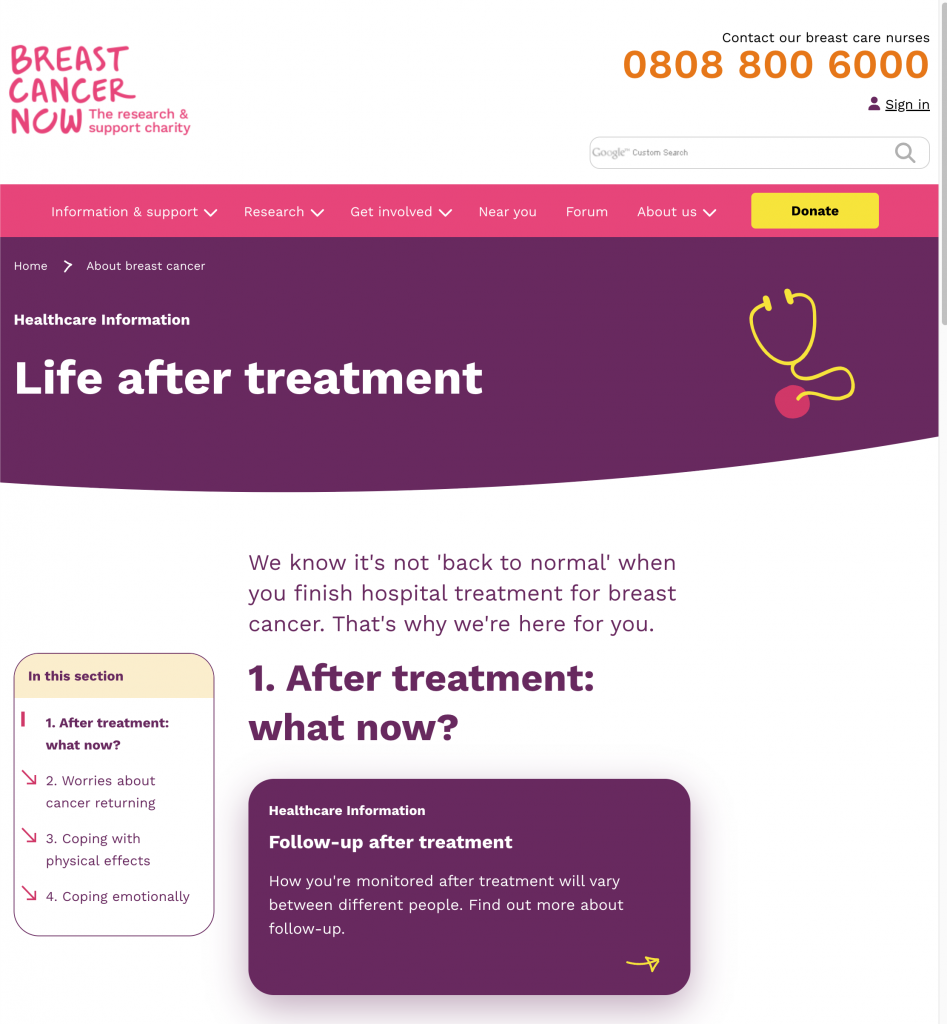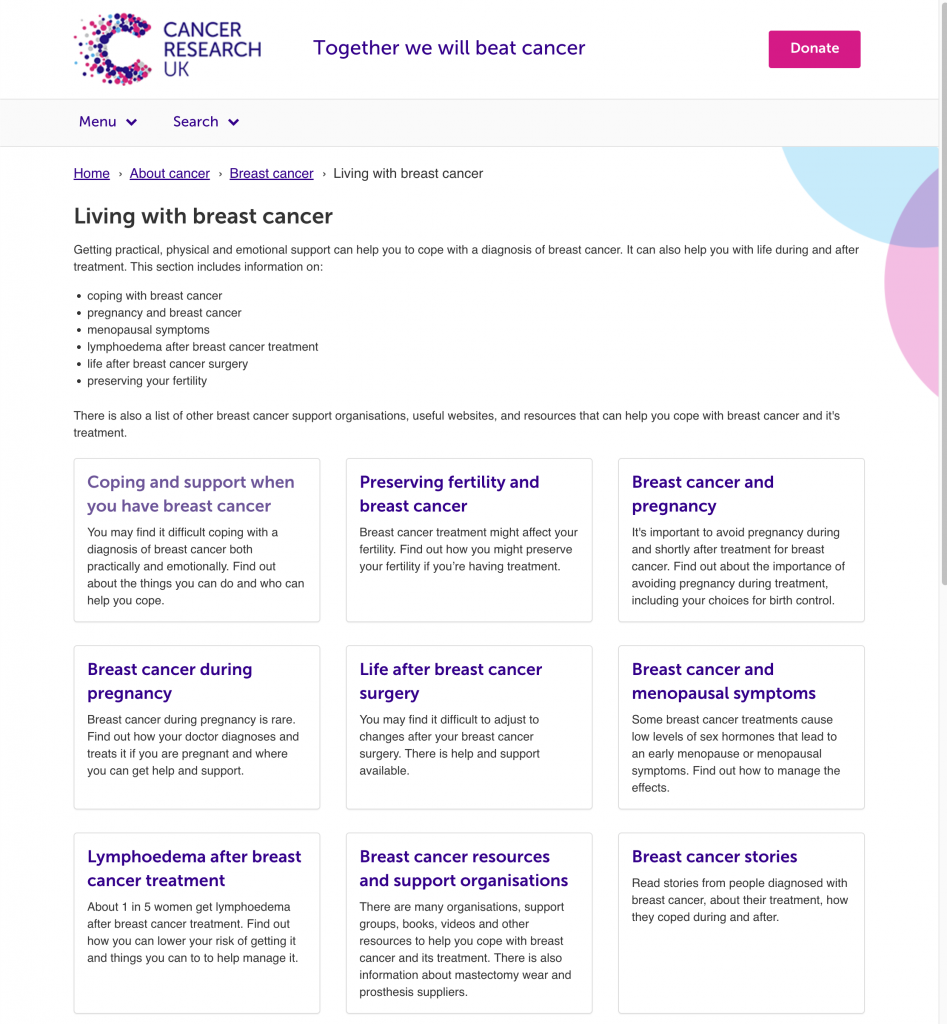Breast Cancer Awareness Month
October is Breast Cancer Awareness Month, an annual event that has been running since 1985.
Initially, the aim was to encourage breast screening and educate people about early detection, and it has developed to include fundraising by charities for vital research.
This year, we wanted to share some facts, figures, and information about how to spot the symptoms and what to know about risk, prevention, early detection, and treatment.
Scroll down to read or use the buttons to jump to individual sections.
About Breast Cancer
Breast cancer is when cells in one or both breasts grow out of control. The breast comprises three main parts: lobules, glands that produce milk; ducts, which carry the milk; and connective tissue. Where it originates and if it spreads determine what type of cancer it is.
The two most common types of breast cancer develop in the lobules or ducts.

Breast cancer is the most common cancer in the UK, with more than 55,000 new cases yearly and around 11,500 deaths.
76% of people with breast cancer live for at least ten years after diagnosis, and figures suggest 23% of all cases are preventable.
Men can also develop breast cancer, but it is much less common, with around 400 cases every year in the UK. On average, breast cancer in men is diagnosed about 10 years later, so knowing the signs is equally important for everyone.
Symptoms
Lumps are the most common symptom of breast cancer, but it’s important to remember that most lumps are not cancer.
All women’s breasts are different in size, shape, and consistency and can change during menstrual cycles or after menopause.
That’s why knowing what is normal for you is important. Understanding how your breasts look and feel at different times of the month means it will be easier to spot any changes.
The most common symptoms that a GP should check are:
- New or bigger lumps
- Thickening of skin tissue or dimpling
- Lumps or swelling in your armpit
- Changes in size or shape
- Changes in nipple position – pulled in or pointing in a different direction
- Rash, discharge, or bleeding from the nipple
- Pain or discomfort that doesn’t go away, especially if it’s new
For men, those same symptoms apply, with lumps tending to be firm, painless and relatively stationary.
Risk & Prevention
One in 7 women will get breast cancer in their lifetime.
Your risk of getting breast cancer is a mix of things you can change and things you can’t
Age and family history are big factors. There are others linked to lifestyle and exposure to certain chemicals and environments.
Lack of regular exercise, an unbalanced diet, obesity, drinking and smoking are all significant contributors and lifestyle changes to be healthy and active are all shown to reduce your chances of developing breast cancer or other conditions like heart disease.
The charity Breast Cancer UK has some excellent guides and resources to help women and men understand and reduce their risk of breast cancer.
Screening
The NHS has a breast cancer screening programme. The checks, also called mammograms, use X-rays to look for signs of cancer that are too small to see or feel.
If registered with a GP as female, you will automatically be invited by the NHS to your first screening between the ages of 50 and 53. You will then be routinely invited back every three years.
Suppose you turn 53 without being invited, or it has been over 3 years since your last invitation. In that case, you should contact the Newcastle Breast Screening Unit, based at the Royal Victoria Infirmary.
The NHS website has valuable information for trans and non-binary people and what to do if you were assigned male or female at birth.
Screening results will either say that you have no signs of breast cancer or that further tests are needed.
Diagnosis and Treatment
You may be referred for specialist tests after seeing a GP about symptoms or after a screening.
Further tests can involve another mammogram, ultrasound, or biopsy (where a cell sample is taken and tested).
If breast cancer is diagnosed, further tests will help specialists understand the stage and grade of the cancer – the size and speed – and the best ways to treat it.
The first stage of treatment is often surgery to remove the cancerous cells, followed by treatment to stop them returning. However, if the cancer is particularly large or fast-growing, treatment might come first to shrink or slow the speed of the cancer.
Types of surgery include:
- Conserving surgery, where the cancerous growth and cells are removed, but the breast tissue is left.
- Mastectomy, where the entire breast is removed. Reconstructive surgery is sometimes down as part of this process or can be done later.
- It is common for lymph nodes in the armpits to all be removed.
Common treatment options include:
- Chemotherapy – drugs delivered through an intravenous drip to shrink or kill cancer cells
- Radiotherapy – high energy beams that target the cells
- Hormonal therapy – regular medication, often tablets, to reduce the risk of cancer returning
- Targeted therapy drugs – injection or drip medicine every three weeks for a year to stop cancer from coming back.
Support
There are many helpful forms of support to help you and your family live with and beyond breast cancer. Click or tap the images below to find out more from Breast Cancer Now and Cancer research UK.


They deal with all aspects, from recovering from surgery, dealing with the emotional impact and worries about cancer returning through to relationships and sex, and how to cope spiritually, practically, or financially.
Here in Jesmond Lower Gosforth, we also have additional specialist support from our Social Prescribing Link Workers, or SPLWs. If you have recently been diagnosed, you can ask to be referred to one of the team who can help you with practical and emotional support.
We will have more on the extra support our SPLWs offer people with newly diagnosed cancer soon.
